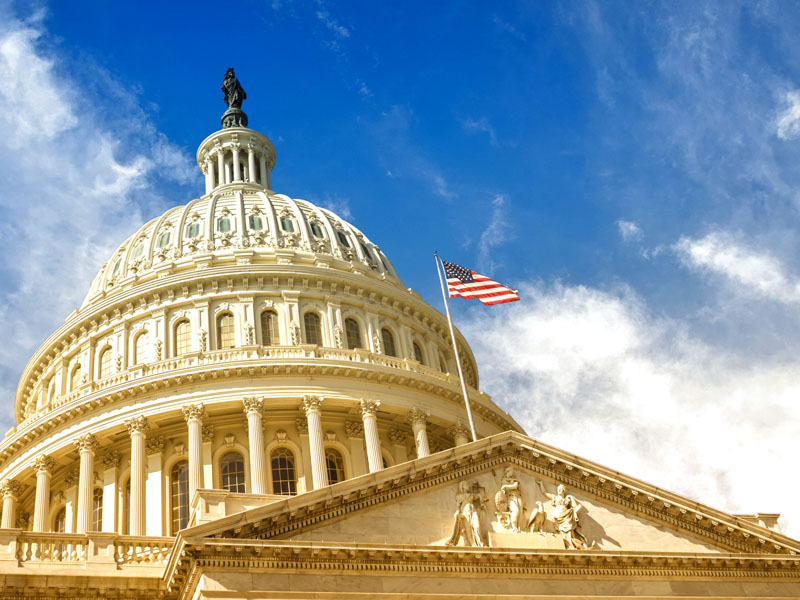AAFP Keeps Vaccine Pressure on Congress; White House Praises FPs
Academy Again Makes Strong Case for Rooting COVID-19 Vaccine Delivery in PC
June 24, 2021, 3:04 p.m. News Staff — In recent written testimony to congressional leaders conducting separate hearings, the Academy reiterated family physicians’ crucial role in vaccination counseling and delivery, as well as in instilling vaccine confidence — including, but not limited to, ongoing COVID-19 immunization. That counsel was underscored by a White House COVID Response Team town hall dedicated to primary care’s ongoing contributions to fighting the pandemic.

“Vaccination strategies should leverage trusted primary care physicians to improve access to immunizations in patients’ own communities and build vaccine confidence,” the AAFP said in its June 22 letter to the Senate Health, Education, Labor and Pensions Committee, in advance of a hearing titled “Vaccines: America’s Shot at Ending the COVID-19 Pandemic” that was held that day.
The letter was addressed to Sens. Patty Murray, D-Wash., and Richard Burr, R-N.C., the chair and ranking member, respectively, of the committee. It was signed by Board Chair Gary LeRoy, M.D., of Dayton, Ohio.
It was the latest salvo in ongoing AAFP advocacy calling on the federal government to coordinate with the CDC and state governors “to ensure that plans for the allocation, distribution and administration of the COVID-19 vaccines prioritize community-based primary care physicians and their practices.”
In support, the testimony cited Medical Expenditure Panel Survey data indicating that primary care physicians provided 54% of all clinical visits for vaccinations of Medicare beneficiaries in 2017, “which made them more likely to administer vaccines than other stakeholders, such as pharmacies or grocery stores.” That also makes family physicians a bulwark, the letter said, against a “flood of misinformation, particularly on social media,” about vaccines, including those developed against COVID-19.
“As trusted members of their communities and the primary source of comprehensive health services in rural and under-resourced areas, community primary care physicians play an integral role in counseling patients and ensuring equitable vaccination rates across the nation,” the AAFP wrote. “Evidence indicates that patients trust and want to hear from their primary care physicians when making decisions about vaccines and would prefer to receive the COVID-19 vaccine in their physician’s office.”
Story Highlights
With that “relationship of trust” in mind, the Academy’s testimony urged the committee to ensure that future vaccine-related legislation
- includes community health centers and rural health clinics in delivery plans to mitigate health inequities and improve access;
- provides robust funding for education and outreach campaigns encouraging routine immunizations and building vaccine confidence;
- mandates adequate payment for the full cost of vaccine administration;
- invests in vaccination programs that consider and mitigate barriers exacerbated by social determinants of health; and
- directs all insurers, including Medicare and Medicaid, to include as a covered benefit all immunizations recommended by the Advisory Committee on Immunization Practices without copayments or deductibles.
To achieve these and related goals, the Academy’s June 22 testimony, as well as separate written testimony sent June 11 to the House Committee on Energy and Commerce’s Health Subcommittee, urged passage of the Protecting Seniors Through Immunization Act (S. 912/H.R. 1978) and the Helping Adults Protect Immunity Act (H.R. 2170).
The former “would help inform beneficiaries about Medicare coverage for vaccines while implementing parity for out-of-pocket costs between Medicare Part B and Medicare Part D,” the letter said, while the latter addressed the fact that some 42,000 Americans die each year from vaccine-preventable diseases.
The June 11 testimony, signed by LeRoy, was sent to Reps. Anna Eshoo, D-Calif., and Brett Guthrie, R-Ky., the subcommittee’s chair and ranking member, respectively, ahead of a hearing titled “A Booster Shot: Enhancing Public Health Through Vaccine Legislation.” It also advocated for passage of
- the Immunization Infrastructure Modernization Act (H.R. 550), which would fund modernization of the U.S. Immunization Information Systems;
- the Maternal Vaccination Act (H.R. 951), part of the AAFP-supported Black Maternal Health Momnibus package investing in the vaccination of pregnant patients; and
- the Strengthening the Vaccines for Children Program Act (H.R. 2347), which would provide incentive payments for participating clinicians to stay in the Vaccines for Children program and encourage the recruitment of new participants and would increase Medicaid payment for vaccine administration to match Medicare payment rates for two years.
Family medicine and vaccines also were on the agenda of the June 11 White House town hall. Academy President Ada Stewart, M.D., of Columbia, S.C., and President-elect Sterling Ransone Jr., M.D., of Deltaville, Va., were among the family physicians dialed into the virtual meeting, titled “Primary Care Providers, Health Systems and the Next Phase of Vaccination Rollout.”
“Many of you have been on the front lines,” U.S. Surgeon General Vivek Murthy, M.D., M.B.A., acknowledged during that meeting. “We owe you an immeasurable debt of gratitude for your sacrifice and your service. Because of you, we now see signs of hope.”
That hope, he and other town hall participants — including White House vaccine coordinator Bechara Choucair, M.D., and Anthony Fauci, M.D., director of the National Institute of Allergy and Infectious Diseases — has much to do with primary care’s role in ongoing vaccination efforts. The 90-minute event spotlighted the ways in which family physicians have lately assumed a “last mile” role in counseling patients individually and delivering needed vaccine doses now that mass-vaccination sites have largely ceased operations.
In a discussion of how best to conduct outreach, for example, the conversation notably touched on a successful Maryland program entrusting vaccine administration to primary care offices. Within weeks, it blossomed from a pilot of 17 practices into a dedicated part of the vaccination infrastructure that included hundreds of enrolled practices.
A recording of the town hall can be viewed online, starting around the 36-minute mark of the video.